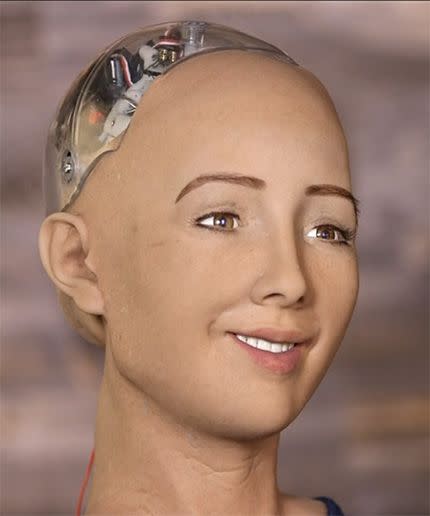If you feel overwhelmed by the presence of your iPhone in your life, you might be alarmed by the news that the world's most sophisticated robots may be assimilated into our everyday lives by 2050, according to experts. For those unfamiliar, SXSW is a week-long, trendy, if not seriously geeky festival of film and culture, panels and discussions. This year, one of the strangest – and either most disturbing or most compelling, depending on where you stand – talks was delivered by Hiroshi Ishiguro, a Japanese inventor and roboticist. The Osaka University professor was speaking about human-like androids and what roles they might fill within society in the near future. Ishiguro discussed his greatest and most marvellous creation to date: a “Geminoid” (robot in his own likeness) whose human appearance has been deftly created through with a plastic skull, a metal skeleton and silicon skin – and is controlled by an external computer. It would be hard, at a glance, to tell the two apart. In fact, the Geminoid held an autonomous conversation in Japanese, on stage, in front of an audience of hundreds.
Geminoid is not Ishiguro’s first uncannily human robot. In 2005, he developed a female android named Repliee Q1Expo, telling the BBC, "I have developed many robots before, but I soon realised the importance of its appearance. A human-like appearance gives a robot a strong feeling of presence. Repliee Q1Expo can interact with people. It can respond to people touching it. It's very satisfying.”
At SXSW on Sunday, Ishiguro discussed how he imagined these human-looking robots might become a part of the everyday sooner than we think; as receptionists, language tutors and museum-guides. In fact, he discussed how he and his team have tried and tested the robots in everyday situations. "Japanese males hate to talk to the shopkeeper because it signals they want to buy something," he explained. "But they don't hesitate to talk to the android." He then jokingly added that it helps that "[a] robot never tells a lie, and that is why the android can sell lots of clothes.” Which begs a couple of questions including why do Japanese males have problems interacting with shopkeepers, and what happens to the shopkeeper in this scenario?
American Robotics developer Dr. David Hanson (head of Hanson robotics) also made robot news at SXSW, unveiling his very own android, Sophia, maybe the world's most advanced android yet. Her appearance is a combination of "Audrey Hepburn and Hanson's wife." Her hyper-real skin is made from silicon and she's able to perform more than 62 facial expressions. Algorithms formed by cameras in her 'eyes' means she can 'see', make eye contact and recognise faces. Apparently Sophia can also process speech – and Google Chrome voice recognition technology means she'll hold onto and develop her 'intelligence' over time.
If this all feels a bit Ex Machina for you, it's worth considering the casualness with which we treat our iPhones, Siri and touchscreen appliances. Besides the $100,000 price tag, experts suggest the presence of androids in our working and personal lives may be imminent. During his panel talk, Dr Hanson touched on the possibility of an android like Sophia being used as a ‘sexbot.’
“The ethical implications are unclear and complicated,” he said. “Do these robots deserve rights, not just against being used for sex work but against being enslaved for any purpose?” He added that he has no intention of developing Sophia as a potential prototype for sophisticated sex toys of the future: “We’re just sidestepping all these issues for now. We’re not going to make sexbots."In a report published last year by futurologist Dr Ian Pearson, it was speculated that by 2050, human-robot sex will be more common than human-human sex, and a large axis of his research was pinned on the release of Oculus Rift (a virtual reality headset) technology, that's due out this year.
Even more disturbingly, sex robot developer Matt McMullen believes that people will be un-aroused by robots that too closely resemble humans; "If you keep it far enough away from super-realism, I think you're in safer territory." So when can we expect to see sex robots on the market? McMullen told The Telegraph, "While some people will enthusiastically embrace relationship-free robot sex as soon as they can afford one, as early as 2025, it won’t have much chance of overtaking sex with humans overall until 2050."
Feminist groups are looking to quash the production of sex robots out of very reasonable fear that they will contribute to gender inequality. Leading ethicist Dr Kathleen Richardson released a statement that said: "We are not proposing to extend rights to robots. We do not see robots as conscious entities. We propose instead that robots are a product of human consciousness and creativity and human power relationships are reflected in the production, design and proposed uses of these robots. As a result, we oppose any efforts to develop robots that will contribute to gender inequalities in society."
We can't be naïve about the growing presence of technology in our lives when we already struggle to put our iPhones down at the dinner table, turn our iPads off during a meeting, and close our laptops before our eyes shut in bed. But how this new superpower will impact our sexual and romantic lives is a much, much more complex matter.What the sophisticated android might add to or take away from the emotional tapestries of our lives is impossible to predict. And whether the growing influence of technology settles into a balance, a steady co-existence, or builds into a dominating presence that might permanently endanger face-to-face human interaction and experience is impossible to answer. But something that we must continue to discuss, and, conside
What Do These Robots Mean For The Future Of Sex?
![What Do These Robots Mean For The Future Of Sex?]() Reviewed by Anaskyspot
on
02:25:00
Rating:
Reviewed by Anaskyspot
on
02:25:00
Rating:







No comments:
Post a Comment